Implementing Machine Learning in Production Planning and Control
In the food and beverage manufacturing industry, where demand fluctuations, seasonal variations, and strict compliance requirements create complex challenges, efficient Production Planning and Control (PPC) is essential. The implementation of Machine Learning (ML) in PPC has emerged as a game-changer, enabling manufacturers to make data-driven decisions with a high degree of precision. ML applications can identify patterns, forecast demand, optimize inventory levels, and streamline production schedules — ultimately enhancing productivity and reducing waste.
For Production Planners in food and beverage manufacturing, this transformation is supported by advanced integration of systems like PlanetTogether with ERP solutions such as SAP, Oracle, Microsoft, Kinaxis, and Aveva.
This blog explores how ML is transforming PPC in food and beverage manufacturing, and how integrating PlanetTogether with ERP systems can enhance the benefits of ML, leading to more resilient, efficient, and agile operations.
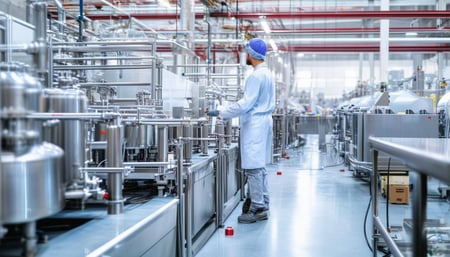
Machine Learning in PPC
Machine Learning algorithms can process vast amounts of data to uncover patterns that would otherwise go unnoticed, making PPC not only more accurate but also more predictive. Here are some key areas where ML implementation in PPC is proving valuable:
Demand Forecasting
ML algorithms analyze historical sales, seasonality, promotional activities, and external factors to forecast demand more accurately.
In food and beverage manufacturing, where demand can fluctuate significantly, ML-driven demand forecasting helps prevent overproduction or stockouts, allowing production planners to optimize schedules and resources.
Inventory Optimization
Maintaining optimal inventory levels is crucial, especially for perishable goods. ML models can predict when materials are likely to be needed, reducing waste and lowering holding costs.
With an integrated system like PlanetTogether alongside an ERP system (e.g., SAP), inventory data can be leveraged to ensure the right amount of stock at the right time, enhancing just-in-time manufacturing practices.
Production Scheduling
ML can dynamically adjust production schedules based on real-time demand and machine availability, significantly improving efficiency.
Integrating ML with PPC through systems like PlanetTogether allows production planners to make quick, informed decisions that keep production on track and meet customer demands.
Quality Control and Predictive Maintenance
Machine learning algorithms are adept at detecting anomalies and predicting machine failures before they occur, minimizing downtime.
In food and beverage manufacturing, ensuring high product quality is non-negotiable. ML-enabled predictive maintenance, paired with platforms like PlanetTogether and ERPs, can help reduce unexpected downtime and enhance quality control.
![]()
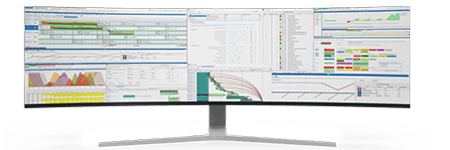
Benefits of Integrating PlanetTogether and ERP Systems with ML in PPC
For a successful ML implementation in PPC, it is essential to have a seamless integration between PlanetTogether, which specializes in advanced production scheduling and planning, and ERP systems like SAP, Oracle, Microsoft, Kinaxis, or Aveva. This integration enables the full potential of ML algorithms, ensuring that data flows smoothly between systems and providing planners with actionable insights in real time.
Enhanced Data Accessibility and Real-Time Decision Making
By integrating PlanetTogether with an ERP system, production planners can access a wealth of real-time data, including order status, inventory levels, and production progress. ML algorithms can then analyze this data to generate insights that allow planners to make real-time adjustments. For example, if an ML model predicts a spike in demand, the planner can adjust schedules and resource allocations to meet that demand, all within a unified interface.
Improved Visibility and Predictive Capabilities
Combining ML with PlanetTogether and an ERP platform boosts visibility across the entire production process, from raw materials to finished goods. This visibility allows production planners to anticipate disruptions, such as supply chain delays or equipment breakdowns, and make proactive adjustments. Furthermore, predictive ML algorithms, using historical and real-time data, can provide insights into future challenges, allowing planners to mitigate risks before they impact production.
Streamlined Workflow with Automated Recommendations
ML algorithms can automate several aspects of PPC, such as generating optimized production schedules or recommending inventory replenishments. When integrated with PlanetTogether and ERP systems, these ML-generated recommendations can be implemented quickly, reducing manual workload for production planners. In the fast-paced food and beverage sector, this automation leads to more consistent production outputs, less downtime, and faster adaptation to changing demands.
Increased Efficiency with Accurate Resource Allocation
One of the primary goals of ML in PPC is to improve resource allocation, ensuring that machines, labor, and materials are utilized effectively. Integrated systems allow ML models to analyze production capacity, workforce availability, and material lead times to create efficient production plans. This coordination helps to reduce bottlenecks, improve resource utilization, and enhance the overall throughput.
Higher Production Flexibility and Agility
In a competitive market like food and beverage, agility is crucial. An integrated ML-driven PPC system can help manufacturers quickly adjust to unexpected changes, whether it’s a shift in consumer demand or a supply chain issue. PlanetTogether’s integration with ERP platforms allows for rapid recalculations of production schedules and resources, providing production planners with the flexibility they need to keep operations running smoothly.
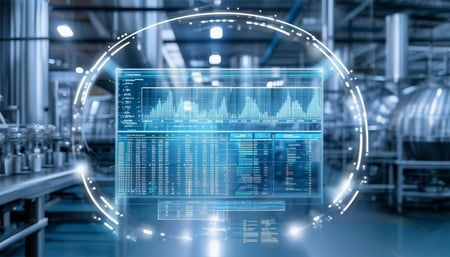
Key Challenges in Implementing ML in PPC
While the benefits of ML in PPC are clear, implementing ML is not without challenges. Here are some common obstacles production planners should consider:
Data Quality and Availability
Machine learning algorithms rely on high-quality data to generate accurate insights. Poor data quality or incomplete data can reduce the effectiveness of ML models, leading to suboptimal decisions.
Integration with ERP systems can help improve data availability, but planners must ensure that data from all relevant sources, including supply chain and production, is accurate and up-to-date.
Integration Complexity
Integrating PlanetTogether, ML models, and ERP systems like SAP or Oracle requires robust IT infrastructure and expertise. This complexity can lead to delays and increased costs.
To mitigate this, it’s important to work with IT teams or consultants experienced in both manufacturing operations and software integration.
Change Management and Workforce Training
The implementation of ML in PPC often involves changes in workflows and requires new skills, such as data analysis and ML model interpretation.
Effective change management and continuous training are crucial to help production planners and operators adapt to the new technology, ensuring a smooth transition.
Data Privacy and Security Concerns
ML implementation, especially when integrated with ERP systems, involves handling sensitive company data. Ensuring that data privacy and security measures are in place is essential to protect against breaches.
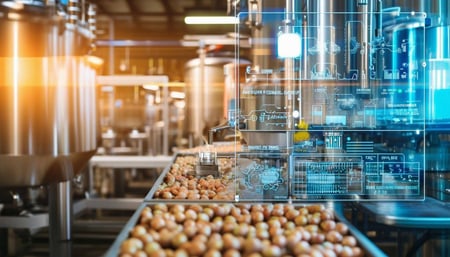
Best Practices for Implementing ML in PPC for Food and Beverage
To successfully implement ML in PPC within the food and beverage industry, consider the following best practices:
Start Small and Scale Gradually
Begin by implementing ML models for specific PPC functions, such as demand forecasting or inventory management. Once these initial applications show value, gradually expand to other areas, including production scheduling and quality control.
Prioritize Data Cleaning and Management
Ensuring that data from PlanetTogether, ERP systems, and other sources is clean and consistent will lead to more accurate ML insights. Establish data governance practices to maintain data quality over time.
Use a Phased Integration Approach
Instead of a complete integration from the start, take a phased approach. Begin with essential integrations between PlanetTogether and ERP systems and progressively add ML models. This approach reduces risks and allows for incremental improvements.
Invest in Workforce Training
Train production planners and operators on the basics of ML, the functions of integrated systems, and how to interpret data-driven insights. This training empowers your team to use ML in PPC effectively.
Leverage Expert Partnerships
Collaborate with IT experts and solution providers like PlanetTogether, who understand the unique challenges of the food and beverage industry. These partners can provide guidance on best practices, integration support, and ongoing maintenance.
Machine learning is redefining Production Planning and Control in the food and beverage manufacturing sector, enabling production planners to make informed, data-driven decisions. By integrating PlanetTogether with ERP systems like SAP, Oracle, Microsoft, Kinaxis, or Aveva, manufacturers can harness the full power of ML, resulting in enhanced visibility, agility, and operational efficiency.
ML will play an increasingly important role in PPC. For production planners, now is the time to embrace this technology, not only to stay competitive but to drive meaningful improvements in production outcomes. Implementing ML in PPC is not just a trend — it’s a strategic investment in the future of manufacturing.
Are you ready to take your manufacturing operations to the next level? Contact us today to learn more about how PlanetTogether can help you achieve your goals and drive success in your industry.
Topics: PlanetTogether Software, Integrating PlanetTogether, Real-Time Decision-Making, Enhanced Data Accessibility, Food and Beverage Manufacturing, Quality Control and Predictive Maintenance, Accurate Resource Allocation, Improved Visibility and Predictive Capabilities, Streamlined Workflow - Automated Recommendations, Higher Production Flexibility and Agility







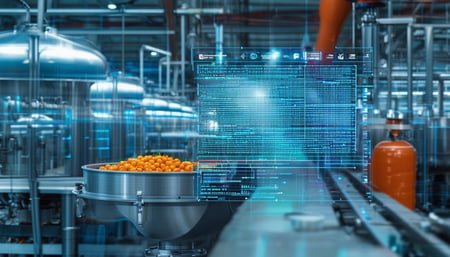













LEAVE A COMMENT